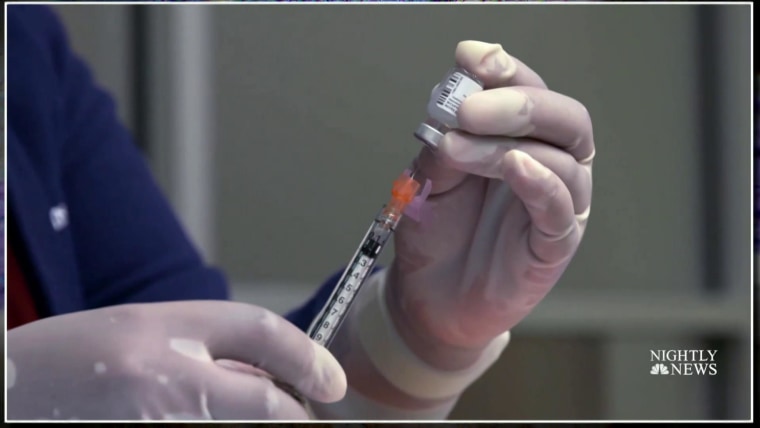Since Covid-19 vaccine distribution started last month, every week has been a test of patience for Dr. Patricia Schnabel Ruppert.
"Right now, I can't book vaccine appointments for next week or the following week," said Ruppert, who is the health commissioner for Rockland County, New York, a small suburb outside New York City. "We don't know how many doses we'll get, so we don't know how to organize staffing or how many volunteers we need."
Full coverage of the coronavirus outbreak
Ruppert can't plan ahead because she has no idea how many doses the county will receive until that week, making it impossible to book appointments in advance without the risk of having to abruptly cancel them, a situation that has already developed in cities across the U.S., including New York.
"It's a week-to-week kind of thing," Ruppert said. "It's like hurry up and wait."
The last-minute allocations are one of the major problems plaguing health departments and hospital systems as they try to vaccinate millions of people in hope of stopping the coronavirus pandemic.
"We know from our local health departments that their requested allocations are not being met or are being canceled in some cases," said Lori Freeman, CEO of the National Association of County and City Health Officials. "It creates a lot of other problems on the ground when you're trying to plan for vaccine clinics."
Freeman said health departments must put in their requests for vaccine doses every week, based on community need and the number of people who have pre-registered. The departments must then wait to find out from the state how many they'll actually be allocated.
You have to think of it this way: We are the last in line to get information, but we’re the first in line for the public.
"When those allocations aren't being met, you can imagine the shuffling that happens," Freeman said. "You have to think of it this way: We are the last in line to get information, but we're the first in line for the public."
Ruppert requests 2,000 doses every week in Rockland County. The first week, she got just half that. The following week, the state allocated only 200 doses. This week, she'll get 1,300 doses, which must be divided among essential workers and those over age 65.
"Absolutely, that is frustrating," Ruppert said. "Just give us the vaccine and we can do this. We've proven we can do this."
It's similar hundreds of miles away, in Dallas.
"The state makes the decisions on how much we get," said Dr. Philip Huang, director of the Dallas County Health and Human Services Department. "We wait to see how much we're allotted. Every day, every hour, things change."
Huang is responsible for running a large vaccine hub that serves Dallas County and the surrounding area. Right now, 400,000 people are signed up on a waitlist to get appointments. But they, too, can't be scheduled until a day or two before a vaccination event.
"We'll send out 6,000 invitations. Then only 2,000 people show up," said Huang, adding that people often sign up on multiple waitlists in different counties to see where they can get in first. With more doses to give, the county sometimes scrambles to send out more invitations for the same day to make sure all of the vaccine is used.
"It's a lot of juggling and trying to make it work," he said. "But we're making it work." As of Tuesday, the county had administered almost 24,000 doses, primarily to those 65 and older.
Marcus Plescia, chief medical officer for the Association of State and Territorial Health Officials, said: "It's really a supply issue. We have 80 to 90 million people clamoring to get the vaccine. These people all want vaccine, and there's not the supply. That's why we're having to shut down some of the clinics, because we don't have the actual products to put into people's arms."
Plescia, whose organization represents state health departments, said the states are given only limited supplies of vaccines by the federal government, and then they must parse them out to local health departments and hospital systems and, in some states, pharmacies. The decisions on allotments are made by advisory committees in each state.
Download the NBC News app for full coverage of the coronavirus outbreak
Experts say responsibility falls on the former Trump administration, as well as on state governments.
Many of the problems could have been avoided altogether if Operation Warp Speed, the Trump administration's public and private partnership responsible for facilitating the development, manufacturing and distribution of vaccines, had put more effort into distribution, said epidemiologist Michael Osterholm, director of the Center of Infectious Disease Research and Policy at the University of Minnesota, who was an adviser to President-elect Joe Biden during the transition.
"What happened is, and I give a great deal of credit to Operation Warp Speed, especially with the R&D and getting it manufactured, but they didn't account for the importance of the last mile, which is distribution," Osterholm said.
Others say states were too quick to open up eligibility.
"We've overpromised," Plescia said. "We've lost sight of the fact that there's limited supply."
The hope is that the Biden administration will follow through on this week's announcement, promising to also inform states three weeks in advance how much vaccine they'll be getting, so they aren't left guessing and waiting.
"If that trickles down to us, that would be awesome," Ruppert said. "That would help."
Follow NBC HEALTH on Twitter & Facebook.
"how" - Google News
January 29, 2021 at 05:00PM
https://ift.tt/3tafXXo
Delayed doses, unfulfilled requests and last-minute allocations: Inside the vaccine rollout - NBC News
"how" - Google News
https://ift.tt/2MfXd3I
Bagikan Berita Ini















0 Response to "Delayed doses, unfulfilled requests and last-minute allocations: Inside the vaccine rollout - NBC News"
Post a Comment